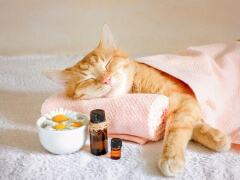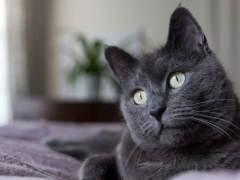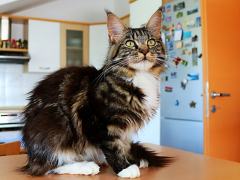
Kirsten McCarthy / Cats.com
The immune system is a complicated but very important component of a cat’s health (and our own). Whether because of immature development, stress or illness, the immune system may not support health the way it needs to. We can look to support the feline immune system in several ways and one may be through a supplement.
In this article, we’ll review some principles and common ingredients found in immune support supplements along with five specific ones to consider further.
What Is an Immune Support Supplement?
An immune system support supplement is one that contains ingredients that are believed to benefit or strengthen the function of the immune system in its defense against infection and disease. Ingredients in an immune support supplement may act on different parts of the immune system in different ways, as the immune system is very complex.
Here are some common ingredients and how they may be of benefit:
Beta Glucan
This is one of the most common ingredients in immune supplements. As a complex polysaccharide, it is a type of soluble fiber found naturally in bacteria, plants, cereal grains, mushrooms, and other food sources. It can bind and activate certain parts of the immune system, lending to its inclusion in supplements.
Zinc
Zinc is a mineral with very important effects on the immune system. For a long time, studies have demonstrated that zinc deficiency leads to lower lymphocyte white blood cell counts and antibody production, and therefore increased susceptibility to infection.
Omega Fatty Acids
Separate from the anti-inflammatory effects known to be provided by omega 3 fatty acids, studies have also demonstrated a positive effect on lymphocyte production and development, a core component of immune response.
Coenzyme Q-10 (CoQ-10)
CoQ-10 is a popular and safe component found in many supplements. It is an antioxidant produced by the body with highest concentrations in the heart, liver, pancreas, and kidneys. In foods, it is found in organ meats, vegetables, fruits, dairy, and eggs. CoQ-10’s immune support is primarily due to its antioxidant properties.
Aging pets may have reduced CoQ-10 naturally produced by their bodies, making a supplement helpful.
Medicinal Mushrooms
Maitake mushrooms are one of the most common types of medicinal mushrooms, as are reishi and turkey tail. Their benefits stem from the polysaccharides (like beta glucan), proteins, and glycoproteins (sugar-containing proteins) that they contain. As a whole, they can have anti-inflammatory, immune-modulating, anti-oxidant, antiviral, and liver protectant properties.
What Are the Benefits of an Immune Support Supplement?

Powdered supplements are a convenient alternative for cats who refuse capsules and soft chews. Kate Barrington / Cats.com
An immune support supplement may be helpful in different situations, depending on what its ingredients are and how it is being used.
For example, omega 3 fatty acids have anti-inflammatory and antioxidant properties. Specific ones, like those found in green-lipped mussel, have shown benefit with inflammatory conditions such as arthritis.
Beta glucan, a polysaccharide found in yeast products (as well as some medicinal mushrooms) has shown benefits in many studies to impact platelets, white blood cell levels, antibody production, pro and anti inflammatory mediators, and the capacity for white blood cells to consume foreign substances like viruses and bacteria. Medicinal mushrooms and CoQ-10 are both used by some veterinary oncologists as part of therapy for specific cancer types.
While there is actual peer-reviewed study evidence for the use of some ingredients, others may have only anecdotal evidence. This means that while official studies may fail to prove a benefit, doctors may see individual benefits in some patients. There are many herbal ingredients like echinacea, turmeric, and licorice root that fall into this category.
The goal of any supplement is to support health, and not contribute to any harm. Some immune supplements may help with short-term conditions like periods of stress during a move, a mild cold, or help a cat recover more quickly from a treatable illness.
While many may be used in cases of chronic diseases or cancer, expectations should be kept reasonable. No supplement is likely to reverse or cure any chronic disease or cancerous process.
Does My Cat Need an Immune Support Supplement?
Not all cats require an immune support supplement but here are some examples of where one may be beneficial:
- Kittens and very young cats with immature immune systems
- Cats who have suffered from malnourishment and/or neglect
- Elderly cats (usually 10 years of age or older)
- Cats with cancer
- Cats with a chronic illness or disease process
- Cats under a higher level of stress or chronic stress
If your cat has a chronic disease process that may actually be caused by the immune system (an immune-mediated illness) a supplement to boost the immune system may not be appropriate. Make sure to check with your vet prior to starting any new supplement.
What Is the Best Immune Support Supplement?

Reishi mushrooms are just one type of medicinal mushroom with known benefits for immune health. Photoongraphy / Shutterstock.com
As with any supplement, some pets may benefit from a particular one while others may not. As the immune system is very complex, response may depend on what part of the immune system is affected or being targeted, what illness a cat has, and what our expectations are.
Supplements are not considered drugs or medications. That means that they are not subject to the same scrutiny in their formulation before they are made and they are not required by law to prove any of their purported benefits (although false label claims may lead to consequences after a product is released).
Selecting a supplement therefore requires careful evaluation of their ingredients, quality, how they’re made, and where they’re made. You can also ask your veterinarian if there is a particular one they recommend.
Looking for the NASC product seal is one way to evaluate a supplement company for quality. NASC member companies are required, through their voluntary participation, to be subject to more stringent guidelines for how their products are made and labeled. Look for products manufactured in the US to reduce the risk of quality control issues with imported products.
Because supplements are usually oral additives or treats, the best one for your cat may also depend on what they like and are willing to take regularly.
5 Immune Health Support Products for Cats
Here are 5 products for cats that can be considered to help support the immune system. They were selected based on their different approaches to immune support, veterinarian-involved formulation, USA manufacture, and high quality control standards.
1. Imuquin by Nutramax Labs
Imuquin is a supplement containing beta glucans, omega 3 fatty acids, and a mix of vitamins and minerals including vitamin B12 and zinc. Administration is simple by sprinkling onto your cat’s food or mixing it in. Nutramax’s yeast-flavored supplements (also including Dasuquin and Proviable) appear to be very palatable to most cats.
Nutramax products are manufactured in the USA with some of the highest quality standards in the animal supplement industry.
2. VetriScience ImmunoDMG Pro Immunity Support
ImmunoDMG Pro is an immune supplement based primarily on the actions of beta glucans, provided through the maitake mushroom. The supplement also has a patented ingredient called Transfer Factor ap that aids in transfer of immune signals between lymphocytes.
VetriScience products are made in the USA in a SQF certified and FDA-registered facility. Their products are also NASC quality certified.
3. Pet Wellbeing Core Immune Care
Core Immune Care takes an all-around health approach with a focus on antioxidant support, joint support and cell repair. It contains glutathione, an antioxidant with known cellular repair properties that can decline with age in cats. Beta glucans are provided through PRALISUR, a patented natural algae-based source.
This supplement also contains types 1 and 3 collagen for joint and immune support. Pet Wellbeing products are manufactured in the USA in a FDA-registered, GMP certified facility.
4. Dr. Bill’s Pet Nutrition Feline Immune Support
Dr. Bill’s Feline Immune Support takes a slightly different approach with their immune supplement. Colostrum is their main approach, which is an early from of milk produced by lactating animals that is dense with immunoglobulins, lactoferrin, tumor necrosis factor alpha (TNF alpha), and proline rich peptides (PRPs) as antioxidants.
It also includes echinacea, an herb many people use for its immune properties and which can purportedly boost T-cell immunity. Rounding it out is the inclusion of CoQ-10. As a powder, this supplement can be added to moist or wet food, or mixed with water or broth. Dr. Bill’s products are manufactured in the USA.
5. Mushroom Max Advanced Immune Support
Mushroom Max made by NaturVet approaches immune health with the inclusion of four different medicinal mushrooms: reishi, maitake, shiitake, and turkey tail. In addition, it contains milk thistle that is beneficial for liver health, and CoQ-10. NaturVet products are manufactured in the USA and carry the NASC quality seal.
Side Effects of an Immune Support Supplement
Starting any new supplement can carry a risk of digestive upset. Always be cautious starting something new if your cat already has a poor or picky appetite.
The safety of oral supplements is never guaranteed. Always make sure to look for products made in the US with high quality control standards. Checking for reviews on products to look for common patterns of concerns among consumers can also be helpful. While products with common complaints may lead to investigation by the FDA, supplements are not scrutinized by the FDA prior to manufacturing the way that medications are.
Zinc in particular may cause toxicity with large doses or overdoses. Common signs of zinc toxicity include vomiting, diarrhea, excessive drinking, and lethargy. Abnormalities of red blood cells may occur with blood serum levels as high as 1 mg/dL.
The types of mushrooms used in immune supplements are very particular. There are thousands of mushroom types and many can actually be toxic. Make sure to never pick mushrooms for your pet or allow them to ingest any found growing outside. Identification of safe versus toxic varieties of mushrooms can be very tricky.
Always check with your vet prior to starting a new supplement, especially one for immune support. Some health conditions where the immune system is an underlying cause may not be appropriate situations to use an immune support supplement. It is also important to be cautious in cases where significant liver or kidney function is compromised.
Frequently Asked Questions
What can I give my cat for their immune system?
This depends largely on your reason for supplementing your cat’s immune system. A generic supplement for cats may be appropriate for aging but otherwise healthy adult cats or in cats with chronic viral infection. For specific conditions, make sure to check with your vet for what may be the most beneficial.
Does lysine help cats’ immune systems?
Lysine supplements were never known to have an overall immune-boosting effect. They had been recommended for a long time to assist cats who specifically suffer from chronic herpes viral infection. In more recent years, the mechanism by which they were supposed to help cats with a respiratory infection from feline herpesvirus has been called into question.
There are some cats who anecdotally may still seem to benefit from lysine supplementation but lysine does not have significant immune-boosting properties compared to other ingredients discussed above. Read further for more information on lysine supplementation in cats.
What supplements are there for feline immunodeficiency virus?
Cats with feline immunodeficiency virus (FIV) can live a normal life but may be more susceptible to acquiring infections. In an otherwise healthy FIV positive cat, supplements containing the ingredients discussed above that can boost antibody production and other immune responses may be helpful.
Besides supplements, it is very important to be aware of your FIV positive cat’s exposure to other animals and contaminated environments because they may not be able to resist infectious organisms present as well as a cat without FIV.
What homemade cat food boosts the immune system?
In theory, foods rich in certain nutrients such as beta glucan, zinc, CoQ-10, and omega 3 fatty acids could provide immune benefiting properties. Medicinal mushrooms (reishi, shiitake, maitake, and turkey tail) are rich in beta glucan as are organ meats and cereal grains.
Foods rich in zinc include red meat, fish, eggs, dairy products, and oats. Omega 3 fatty acids are found in marine oils especially salmon oil and green-lipped mussel.
-
Maturana, M., Castillejos, L., Martin-Orue, S. M., Minel, A., Chetty, O., Felix, A. P., & Lesaux, A. A. (2023). Potential benefits of yeast Saccharomyces and their derivatives in dogs and cats: a review. Frontiers in Veterinary Science, 10. https://doi.org/10.3389/fvets.2023.1279506
-
Murphy, E. A., Davis, J. M., & Carmichael, M. D. (2010). Immune modulating effects of β-glucan. Current Opinion in Clinical Nutrition & Metabolic Care, 13(6), 656–661. https://doi.org/10.1097/mco.0b013e32833f1afb
-
Shankar, A. H., & Prasad, A. S. (1998). Zinc and immune function: the biological basis of altered resistance to infection. American Journal of Clinical Nutrition, 68(2), 447S-463S. https://doi.org/10.1093/ajcn/68.2.447s
-
Corbee, R. J. (2022). The efficacy of a nutritional supplement containing green‐lipped mussel, curcumin and blackcurrant leaf extract in dogs and cats with osteoarthritis. Veterinary Medicine and Science, 8(3), 1025–1035. https://doi.org/10.1002/vms3.779
-
Rutherfurd-Markwick, K., Hendriks, W., Morel, P., & Thomas, D. (2013). The potential for enhancement of immunity in cats by dietary supplementation. Veterinary Immunology and Immunopathology, 152(3–4), 333–340. https://doi.org/10.1016/j.vetimm.2013.01.007
-
Ruparell, A., Alexander, J. E., Eyre, R., Carvell-Miller, L., Leung, Y. B., Evans, S. J. M., Holcombe, L. J., Heer, M., & Watson, P. (2024). Glycine supplementation can partially restore oxidative stress-associated glutathione deficiency in ageing cats. British Journal of Nutrition, 1–15. https://doi.org/10.1017/s0007114524000370







